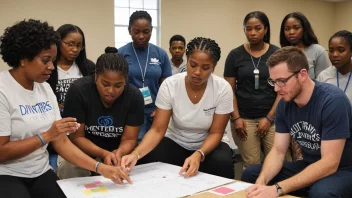In a world where knowledge is power, the inability to read and write can put individuals at a significant disadvantage. Adult literacy is not just about learning letters and numbers; it is a gateway to opportunities, self-empowerment, and community development. Community-based approaches to adult literacy programs have emerged as effective strategies to engage learners, tailor education to local needs, and foster a spirit of collaboration. These initiatives not only transform the lives of individuals but also empower entire communities, creating a ripple effect of positive change.
The Importance of Adult Literacy
Adult literacy is a critical component of personal and societal development. According to UNESCO, over 773 million adults worldwide lack basic literacy skills. This deficit can lead to a cycle of poverty, marginalization, and limited access to employment opportunities. Literacy enables individuals to make informed decisions about health, finances, and civic participation. Furthermore, literate adults are more likely to engage in lifelong learning, contributing to their communities in meaningful ways.
Community-Based Approaches: A Collaborative Model
Community-based approaches to adult literacy programs prioritize the unique needs and contexts of local populations. These programs often involve collaboration among various stakeholders, including local governments, non-profit organizations, educational institutions, and community members. By leveraging local resources and knowledge, these initiatives can create a more relevant and effective learning environment.
Tailoring Programs to Local Needs
One of the strengths of community-based adult literacy programs is their ability to be customized. For instance, a program in a rural area may focus on agricultural literacy, teaching farmers how to read and understand agricultural manuals, while a program in an urban setting may prioritize financial literacy, helping individuals navigate banking systems and manage personal finances. Engaging with the community to identify specific needs ensures that the program is not only relevant but also impactful.
Building a Supportive Learning Environment
Creating a supportive environment is crucial for adult learners, many of whom may have experienced barriers to education in their youth. Community-based programs often incorporate peer learning, mentorship, and emotional support, fostering a sense of belonging and encouragement. When learners feel valued and supported, they are more likely to persist in their educational journeys.
Successful Initiatives Around the World
Many communities have successfully implemented adult literacy programs that exemplify the community-based approach. These initiatives serve as models for others looking to make a difference.
The Adult Literacy Program in Brazil
In Brazil, the "Movimento Brasil Competitivo" (MBC) has created a network of community-based literacy programs that focus on social inclusion. By involving local leaders and organizations, the MBC has successfully increased literacy rates in underserved areas. Participants not only learn to read and write but also gain skills in entrepreneurship, health education, and civic engagement.
Literacy for Empowerment in Kenya
In Kenya, the "Literacy for Empowerment" initiative emphasizes the importance of local languages in adult education. By using culturally relevant materials and teaching methods, this program has significantly increased literacy levels among rural populations. The initiative also incorporates life skills training, enabling participants to apply their newfound literacy skills to improve their livelihoods.
How Individuals Can Get Involved
Community-based adult literacy programs thrive on the involvement of passionate individuals. Here are several ways you can contribute:
- Volunteer as a Tutor: Offer your time to teach literacy skills in your community. Many organizations are always looking for volunteers to support their initiatives.
- Advocate for Literacy: Raise awareness about the importance of adult literacy in your community. Use social media, local events, or community meetings to spread the word.
- Support Local Initiatives: Identify and support local literacy programs through volunteering, sharing resources, or simply attending events.
- Organize Workshops: Collaborate with local organizations to host workshops that focus on specific skills, such as financial literacy or health education.
Global Challenges and the Future of Adult Literacy
Despite the progress made in adult literacy, significant challenges remain. The COVID-19 pandemic exacerbated existing inequalities, disrupting education and limiting access to resources for many adult learners. Additionally, socio-economic factors continue to hinder literacy efforts in various regions. However, community-based approaches offer a path forward, emphasizing resilience, collaboration, and adaptability.
The Role of Technology
Technology can play a pivotal role in enhancing adult literacy programs. Mobile learning applications, online resources, and virtual classrooms can supplement traditional learning methods, making education more accessible. However, it is crucial to ensure that technology is used to complement, rather than replace, community engagement and support.
Conclusion
Community-based approaches to adult literacy programs represent a powerful strategy for fostering empowerment and social change. By tailoring education to local needs, creating supportive environments, and engaging individuals, these initiatives can transform lives and communities. The path to literacy is not just about reading and writing; it is about opening doors to opportunities, fostering self-esteem, and enabling individuals to contribute meaningfully to society. As we continue to advocate for adult literacy, let us remember that every action counts, and together, we can create a world where everyone has the opportunity to learn and thrive.






